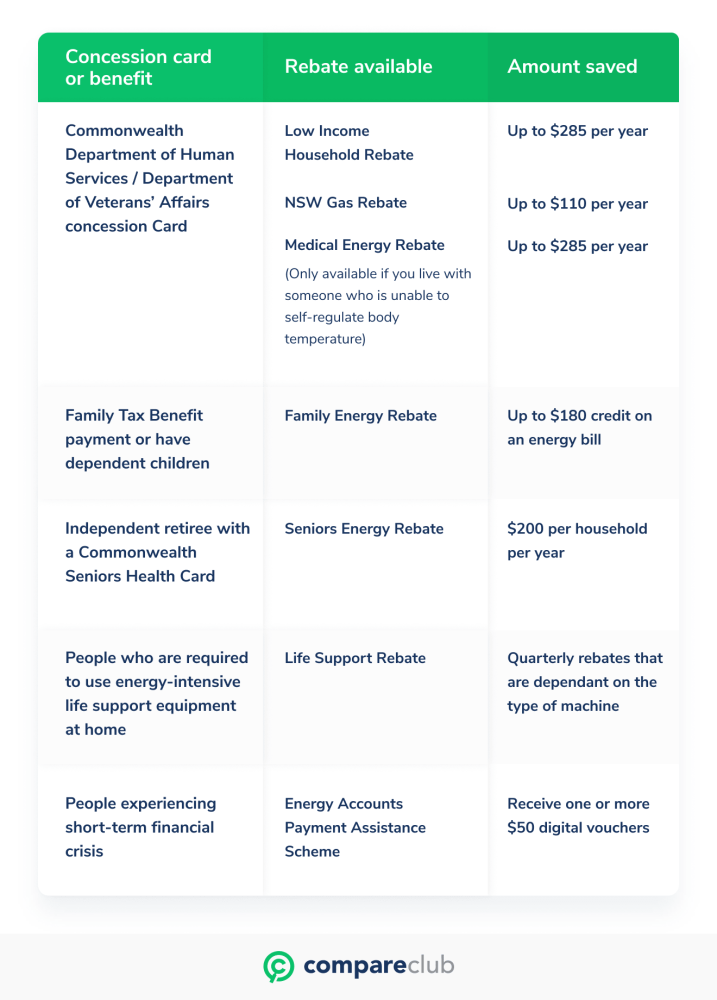A Guide to Gas, Electricity & Solar in Sydney & New South Wales
Overview
If you feel like your electricity and gas bills keep going up, don’t fret.
It's not hard to find a cheaper plan and save money.
But first it pays to understand how the NSW market works, so you can make a more informed decision on your next energy plan.
Key Points
Regional NSW households pay more for electricity than Sydney.
The Default Market Offer (DMO) caps the maximum rates energy providers can charge in NSW.
There are a range of energy concessions and rebates available to NSW residents.
How does the energy market work in NSW?
There's three wholesale energy distributors that cover different parts of NSW, which can impact the plans you can receive.
Ausgrid covers Sydney, the Hunter region and the Central Coast.
Endeavour Energy covers Greater Western Sydney, the Blue Mountains, the Southern Highlands and the Illawarra region in NSW.
Last but not least, Essential Energy covers the remaining 95% of NSW.
These wholesale energy distributors are different from energy providers.
They're the distributors that connect your house or business to power lines or meters.
Energy providers such as Energy Australia and Origin are companies that bill you for your energy usage.
There are two types of offers that can be given to you by your energy provider, which is a standing offer or a market offer.
Standing offers include rates set by the wholesale energy distributor and the rate cannot be changed more than once every six months.
In NSW, the Australian Energy Regulator (AER) sets the Default Market Offer (DMO), which caps the maximum rates energy providers can charge you on a standing offer.
A market offer, on the other hand, is typically cheaper than the DMO and includes special deals or discounts.
These are often temporary, which means the energy provider can change those rates at any time.
What energy providers are available in NSW?
We compare 14 of Australia's leading energy providers in NSW.
The power is in your hands as there's lots of competition in the energy market.
That's why it pays to regularly compare energy providers to find the best deal for you, but not all energy providers listed above might service your area.
What is the Default Market Offer in NSW?
The Default Market Offer (DMO) is essentially a safety net that prevents energy providers from hiking up your energy rates without your knowledge.
However, the DMO is not necessarily the cheapest energy deal on the market, so you usually have good chances of finding a better deal if you do your research.
What is the average cost of electricity in NSW?
In 2019/20 the average annual electricity bill for households in NSW was $1,292 at an average cost of 30.65c per kilowatt hour.
Government body AMEC is predicting an average cost drop of $70 per household for the 2020/21 period and an overall decline of 2% by 2023.
What's likely to impact my electricity bill?
Energy providers tend to charge a flat daily fee and a variable rate.
The daily fee relates to costs associated with network maintenance.
The variable rate is applied to the electricity you consume.
The variable rate tends to change throughout the day.
Peak rates apply when there is highest demand on the energy network, and cheaper off-peak rates apply when demand is low.
Switching your usage to off-peak times whenever possible can help you take advantage of those cheaper rates.
There are a range of things you can do to try and reduce your bill, which include running your washing machine and dishwasher late at night instead of during the day.
Who are the best retailers for electricity in NSW?
Choosing an energy provider is not always a one-size-fits-all solution but NSW residents have a wide range of options to choose from.
To find the best deal for your needs, it’s a good idea to compare different tariffs based on your budget and consumption habits.
It’s also good to remember that what’s best for you might not be ideal for someone else.
Some people prefer to pick their energy provider based on the cheapest price whereas others prefer an energy supplier that’s focused on renewable energy or offers discounts for having solar panels installed.
It's easy to compare energy providers online and find great deals at the click of a button.
COMPARE & SAVEWhat is the average cost of gas in Australia?
According to Statista, on average, an Australian household spends $282 a quarter on gas, which comes to an additional $1,128 in energy costs every year.
What’s likely to impact my gas bill?
According to Australian government figures, water heating accounts for 21% of household energy consumption.
The efficiency of gas hot water systems can have a huge impact on your gas bill.
If you think the gas hot water system you currently have is too energy hungry, a newer and more energy-efficient model may help bring your gas bill down.
Alternative renewable energy sources should also be considered when trying to reduce your gas bill.
You might consider switching to a solar hot water system despite the high upfront cost as it can mean you’ll save more money later on.
Who are the best retailers for gas in NSW?
It's important to consider your own energy needs as what gas retailer works for your family might not work for another.
This is due to different everyday usage habits, as this is what drives your bill up.
Comparing gas providers is always a good way to find the right deal for your needs.
Is electricity or gas more expensive in NSW?
Electricity is measured in kilowatt hours and gas is measured in megajoules, so comparing the two is a little like comparing apples to oranges.
And individual rates - what you end up paying for gas or electricity - will depend on your consumption and appliances.
However, generally, gas appliances may be more expensive to install than electric appliances, but cheaper to run.
How do energy costs in NSW compare to the other states?
v can vary greatly between states.
In 2019/20, for example, South Australians paid the highest rates per kilowatt hour (37.68c), followed by NSW (30.45c), VIC (29.28c), the ACT (27.50c), QLD (25.45c), and TAS (24.59c).
Is the NSW energy market different from other states?
Energy markets are regulated independently, so there are differences between states.
The DMO cap only applies to NSW, SA and Southeast QLD.
That means the rest of QLD, VIC, ACT, WA, TAS and the NT all operate under different market regulations.
Can I get any concessions and rebates on my energy in NSW?
Absolutely.
The NSW government offers a range of energy concessions and rebates.
Compare Club can help you find the right rebates for you.
You can find a full list of concessions at Service NSW's website.

Are there any solar providers in NSW?
There certainly are.
Red Energy, Alinta Energy, EnergyAustralia, Lumo Energy, Origin, AGL, Dodo and Aurora Energy all provide solar energy services in NSW.
Are there any green energy providers in NSW?
Most energy providers in NSW offer customers the option to contribute a carbon-offset fee, or to sign up for a GreenPower plan (essentially a carbon offsetting program).
Beyond carbon offsetting, Powershop and Diamond Energy have been ranked as high-performing green energy providers.
Powershop owns wind farms and hydro plants in New South Wales, and Diamond Energy owns biogas plants along with solar and wind farms.
What's the difference between an energy supplier and an energy provider?
An energy provider is the retail organisation you deal with.
That's the company with their logo on your energy bills.
There are dozens of energy providers servicing NSW.
Energy suppliers (also known as energy distributors) work to manage and maintain the electricity network throughout NSW.
In NSW, there are only three energy distributors.
Ausgrid
Essential Energy
Endeavour Energy
Does it take long to switch energy providers?
You can switch energy providers in no time at all.
Compare Club can find you a better deal on your energy in just minutes while our specialists handle all the transfer paperwork for you.
How can I get cheaper energy bills in NSW?
The key is to shop around regularly.
Energy providers compete for your business and prices and discounts often change every month.
Compare Club can quickly help you discover if there’s a cheaper deal in just a matter of minutes.
The best way to reduce your energy bills is to regularly compare plans and see where you may be able to save.
Compare your energy provider against competitors to see how your current deal stacks up.
COMPARE & SAVEThis guide is opinion only and should not be taken as financial advice. Check with a financial professional before making any decisions.
